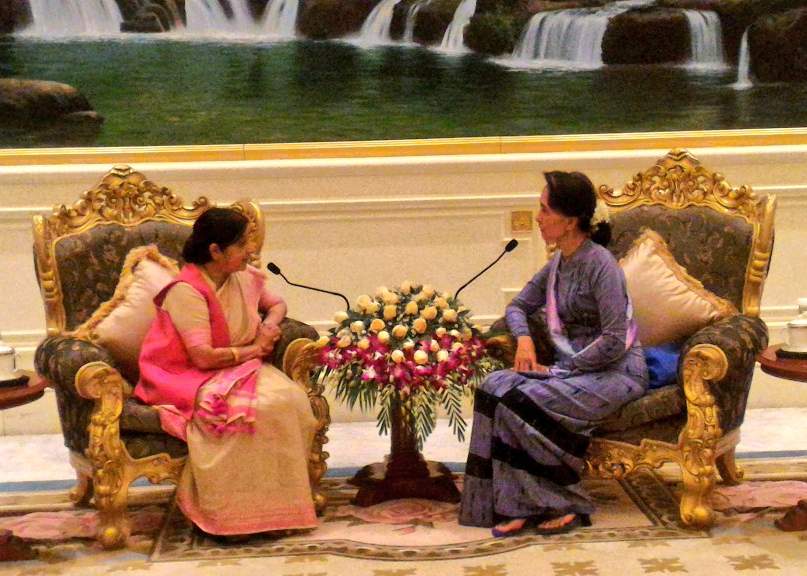India’s foreign minister, Sushma Swaraj, arrived in Burma for a one-day visit on Monday, a day after State Counsellor Aung San Suu Kyi’s return from a high-profile trip to China, and just days after ethnic rebels in India’s Northeast claimed they had been pursued into Burmese territory by Indian military forces.
According to a statement posted on the website of the Indian External Affairs Ministry, the visit is the first major political exchange between Burma and India since Suu Kyi’s National League for Democracy assumed power earlier this year.
The statement added that the focus of Swaraj’s meetings with Suu Kyi and President Htin Kyaw would likely be the upcoming BRICS-BIMSTEC Outreach Summit, which will bring together South Asian and other developing economies.
It also referred to close bilateral relations in a number of areas, including agriculture, infrastructure development, and culture. No mention was made, however, of another key concern – the threat posed by insurgent armies operating along the two countries’ long and porous border in India’s remote Northeast.
On Friday, the National Socialist Council of Nagaland (Khaplang), an ethnic Naga armed group, accused the Indian Army and the paramilitary Assam Rifles of carrying out an operation against the group inside Burmese territory. Indian military sources denied the raid took place.
If true, this would not be the first time that Indian forces had mounted an assault against Naga rebels inside Burma. An offensive in June 2015 took them up to 5 km beyond the border, apparently with the permission of the Burmese side.
Although last week’s alleged incident is unlikely to complicate Sushma’s visit, it highlights the contrast between India and its regional rival China in terms of their respective roles in dealing with ethnic rebels in Burma.
[related]
Whereas India depends on Burma’s cooperation to contain its own insurgent problem, China has used Burma’s desire for peace to gain substantial leverage in its relationship with its smaller neighbour, which has recently undertaken an ambitious effort to end decades of ethnic conflict.
The timing of Swaraj’s visit, coming so soon after Suu Kyi’s trip to China, was seen by one Indian analyst as evidence of New Delhi’s eagerness to maintain strong ties with Burma, even as China positions itself to be a major partner in the peace effort.
“We have reasonably good cooperation with Myanmar [Burma] which we can build on,” S.D. Muni, a former professor at Jawaharlal Nehru University, was quoted by Indian media outlet Livemint as saying. “The visit by Sushma Swaraj will show that we are not neglecting Myanmar.”



